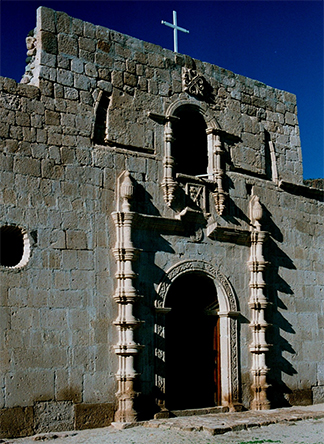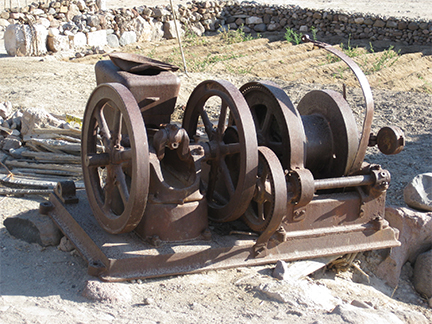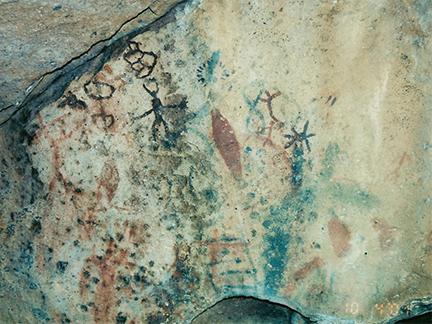 |  |
San Borja, it's more than a mission!
Article and photos by David Kier; except: first mission photo by Jack Swords

Located in the central desert of Baja California midway between the Pacific and Gulf of California, San Borja offers many sites to visit, photograph and enjoy. The history here dates back to the mid 1700's when the Jesuit Order of missionaries, in charge of the peninsula's development, were seeking the next site to the north. Nearby rock art dates back even further in time.
The padres were told of a place, known to the natives as 'Adac', with a warm sulfur spring. The water, they were told, became drinkable once it had cooled. The development for a new mission began! The Camino Real was extended some 90 miles northward for the three day journey from the closest mission of Santa Gertrudis, and a 'visita' (satellite mission visiting station) was built at Adac in 1759.
Founded in 1762, the new mission of San Francisco de Borja Adac would become one of the most populated mission centers with over 3,000 converts, to the European ways. The Jesuits had only constructed some adobe rooms and thatched huts at San Borja when they were ordered removed from the New World, following rumors of their supposedly hoarded wealth, that wasn't shared with the King. In fact, so poor were the Jesuits in California, that they could not even support themselves without the financial aid from wealthy benefactors and assistance from the successful mainland Mexico missions.

In 1768, the Franciscans had replaced the Jesuits and during their 5 years on the California Peninsula. It was they who had built the large adobe mission church at San Borja. Now partially protected from rain by a steel awning, the adobe ruins are located behind the massive cut stone church built by the Dominican Order who replaced the Franciscans in Baja California, in 1773. San Borja is the most northern stone Spanish mission building.
The huge stone church in the middle of the cactus covered Baja California desert is quite a site. The construction here ended in 1801, with only the bell tower not added. The native population had dropped to just a few hundred souls after the European introduced diseases, to which they had little resistance. The mission was abandoned in 1818, but would continue through the years to be used for church services by newly arriving Mexican people from the mainland, as well as the former Spanish soldiers who married native women and stayed on the peninsula as ranchers and farmers.

Just one family lives at San Borja now, headed by José Gerardo who can arrange tours to the out-laying mission buildings and tombs, to the Jesuit's growing fields and to the hot spring nearby. A few miles drive will take one to some interesting rock-art sites. To the south of San Borja, the mission highway El Camino Real is seen making a switchback climb to the top of a mesa. Mule back trips lasting as long as needed can be arranged through Jose to ride to many sites in the region, not accessible to four wheel drive rigs.
José has constructed several palapas where you can set up camp at San Borja. There is an eco-resort of sorts to the southwest of San Borja near old Rancho San Gregorio, called El Canto de la Tierra

The natural desert cactus gardens are some of the best in all of Baja surrounding San Borja. Just 2 miles south of the Bahia de los Angeles highway is a 7 mile side road to Montevideo, a colorful rock art display on cliffs one can drive right up to. The desert vegetation along this road may be the finest example of what Baja has to offer. Have your cameras ready!
The two dirt roads to San Borja are graded and don't require four wheel drive, in dry weather. However, because of a few rough areas, it may be best traveled in an SUV, pickup or van. The north road comes in 22 miles from the paved highway to Bahia de los Angeles at a point 28 miles from Highway 1 and 14 miles from Bahia de los Angeles. The west road is also 22 miles long and reaches Highway 1 at the town of (Nuevo) Rosarito (at the big curve on the highway).